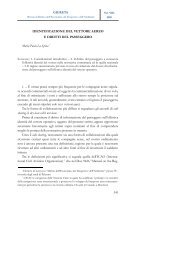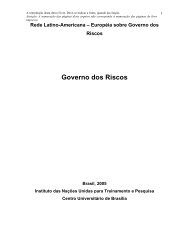Rome II and Tort Conflicts: A Missed Opportunity Abstract Contents
Rome II and Tort Conflicts: A Missed Opportunity Abstract Contents
Rome II and Tort Conflicts: A Missed Opportunity Abstract Contents
You also want an ePaper? Increase the reach of your titles
YUMPU automatically turns print PDFs into web optimized ePapers that Google loves.
SYMEON C. SYMEONIDES ROME <strong>II</strong> AND TORT CONFLICTS<br />
polices. The clearest example is Article 7 pertaining to environmental torts, which is<br />
58<br />
discussed in some detail later. Other less obvious examples are: Article 14(2)-(3),<br />
prohibiting choice-of-law clauses to the extent they violate certain m<strong>and</strong>atory rules of<br />
a non-chosen state or of the Community; Article 14(1)(b), allowing pre-tort choice-oflaw<br />
clauses only in contracts between commercial parties <strong>and</strong> subjecting them to<br />
certain limitations; <strong>and</strong> Article 6(4), prohibiting choice-of-law agreements in cases of<br />
unfair competition <strong>and</strong> restrictions to competition.<br />
F. Issue-by-Issue Analysis <strong>and</strong> Dépeçage<br />
Modern choice-of-law doctrine <strong>and</strong> practice have come to recognize that in<br />
many cases the conflict is confined to only some aspects or “issues” of the case, <strong>and</strong><br />
that in other cases the involved states may be interested in different aspects of the<br />
case. Consequently, rather than seeking to choose a law as if all aspects of the case<br />
were in dispute, the modern decisionmaker focuses on the narrow issues with regard<br />
to which a conflict exists <strong>and</strong> proceeds accordingly. Such issue-by-issue analysis is<br />
easier <strong>and</strong> more likely when the decisionmaker is not bound by statutory choice-oflaw<br />
rules. When such rules exist, however, such an analysis is possible only to the<br />
extent the rules permit it. In turn, this depends on whether these rules are phrased in<br />
broad terms designating the law that would govern the case as a whole, or whether<br />
they are phrased in narrower terms.<br />
On the whole, <strong>Rome</strong> <strong>II</strong> takes a negative stance towards issue-by-issue analysis,<br />
apparently because of the drafters’ desire to avoid as much as possible one of its<br />
byproducts—the phenomenon of dépeçage, namely the application of the laws of<br />
different states to different issues in the same case. Indeed, the Council <strong>and</strong> the<br />
Commission specifically rebuffed the rapporteur’s <strong>and</strong> Parliament’s efforts to<br />
introduce issue-by issue analysis. One of Parliament’s amendments on first reading<br />
had attached the following concluding sentence to what became the general rule of<br />
Article 4: “In resolving the question of the applicable law, the court seised shall,<br />
59<br />
where necessary, subject each specific issue of the dispute to separate analysis.” The<br />
Council <strong>and</strong> Commission rejected this amendment. In the end, most of <strong>Rome</strong> <strong>II</strong>’s<br />
articles were phrased in broad terms designating the law that would govern the case<br />
as a whole, the “tort/delict.” Article 15 reaffirms this holistic approach by providing<br />
a long list of issues that comprise the scope of the law applicable under these<br />
articles. 60<br />
58. See infra V<strong>II</strong>I.<br />
59. EUR. PARL. FINAL A6-0211/2005, (June 27, 2005) p. 19/46.<br />
60. Art. 15 provides that the scope of the applicable law encompasses virtually all issues likely to<br />
arise in tort litigation, including the basis <strong>and</strong> extent of liability, the grounds for exemption from<br />
liability, any limitation of liability <strong>and</strong> any division of liability, the existence, the nature <strong>and</strong> the<br />
(continued...)<br />
56 AMERICAN JOURNAL OF COMPARATIVE LAW (2008) PAGE 13 OF 46



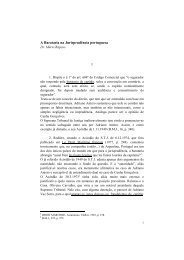

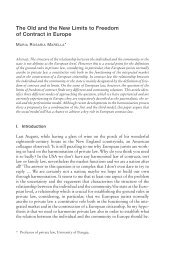

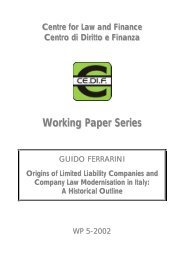
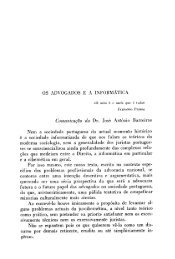
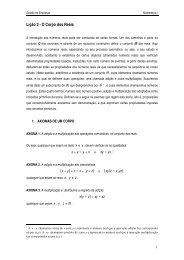

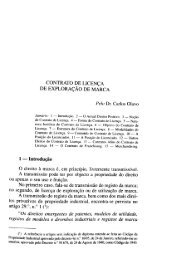
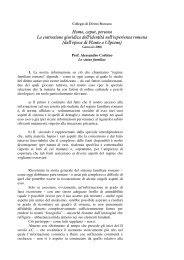
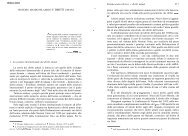

![Luigi Sapio Nozione di islām La parola “islām” [ ] è il mas.dar1 ...](https://img.yumpu.com/15836073/1/185x260/luigi-sapio-nozione-di-islam-la-parola-islam-e-il-masdar1-.jpg?quality=85)
